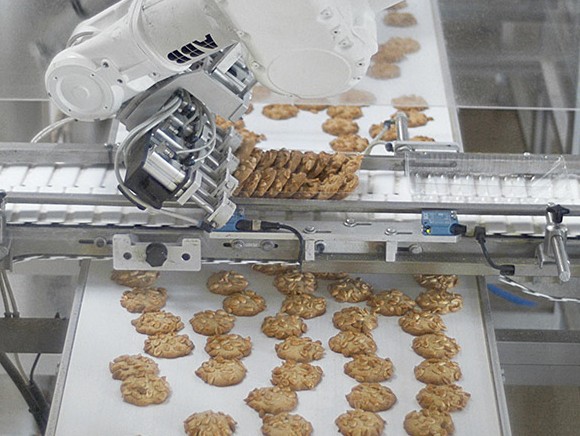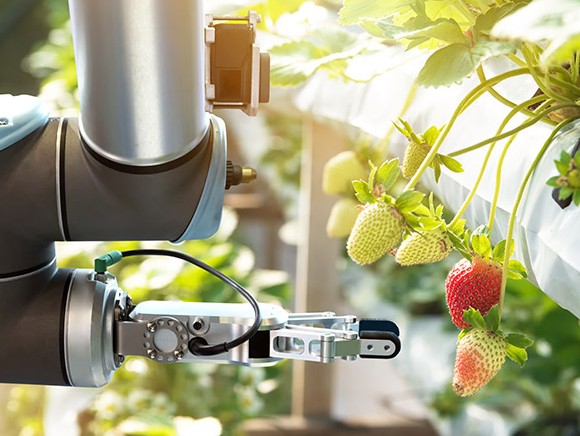
What every manufacturer ultimately wants is to make customised products with better quality and at lower costs. Recent figures reveal that the food industry is investing heavily in the enabling technologies such as big data processing, blockchain, the Internet of Things, adaptive robots and 3D printing.
In mid-October the International Federation of Robotics (IFR) published its annual robotics report containing the 2016 statistics. Dutch manufacturing companies purchased 1,778 new robots last year – a 20% increase on the previous year and the highest number ever! According to IFR estimates, the number has almost doubled over the past decade and there are now over 11,000 robots in use in Dutch factories. Much of that rapid growth comes from the food industry, where 429 new robots were set to work last year (compared to less than half that number in 2015). In fact the food industry added more new robots than even the automotive sector, which up until 2016 had been the biggest robot user.
‘Industry 4.0’ – connecting the real-life factory with virtual reality – is playing an increasingly important role in global manufacturing. Robot suppliers are developing and commercialising new service models based on real-time data which is gathered by sensors fitted to the robots. Analysts foresee a rapidly growing market for cloud robotics in which one robot’s data is compared against the data from other robots, either at the same location or elsewhere. The robots connected to the cloud network can perform the same activities. The technology is used to optimise the robot’s parameters such as speed, angle or power. According to the analysts’ predictions, big data in manufacturing will ultimately redefine the boundaries between machine builders and production companies.
Robots are clearly here to stay in the world of business, and in Industry 4.0 they play a leading role in keeping companies competitive. The Netherlands is internationally recognised as a key player in the areas of robotics and smart industry, but clear standards – such as relating to safety and technical integration – are required in order for these technologies to be utilised effectively. Work is therefore currently underway to develop standards that are aligned with the demands of emerging markets and modern robotics technologies. Existing standards must be adapted, and new standards are needed in some cases. In illustration of just how topical this issue is: on Tuesday, 24 October 2017 the Netherlands-based standards organisation NEN organised an event in The Hague, in collaboration with the Dutch Ministry of Economic Affairs, about the role of robotisation for Smart Industry and safety in the interaction between humans and robots. Some of the questions needing answers are: When is a robot considered ‘safe’? How can we avoid a machine harming a human? And if it should happen, who is responsible? Safety-related standards must ensure that robots in the workplace do not pose a threat.
Another burning question on many people’s lips is: will robots take over our jobs? Mark Menting is managing director and co-founder of Smart Robotics, a temping agency for robots. Important customer segments are the food industry, logistics and e-commerce – both food and non-food companies that primarily sell to retailers. “From experience, we know that robots can make many people’s work easier and more enjoyable,” says Menting, “because, in production processes, robots mainly tend to be used for repetitive tasks and heavy physical work. A production operative who has to stack pallets with 10 boxes a minute continuously makes the same repetitive movement. That’s very physically demanding, especially for older employees. Robots are a great solution in such situations.” He is not afraid that robots will reduce the number of jobs for people. “You often hear that employees must be able to program a computer and that there will soon only be jobs for highly educated people. I disagree. We are seeing a shift in focus, however: people are doing more controlling tasks, moving more towards monitoring process quality so that they can quickly intervene and reduce downtime.”
Smart Robotics works with small, compact robots, and especially palletisers. “They are fairly straightforward and don’t require major investments. Non-technically skilled employees can work with them too; the robotic arm just has to be programmed with some standard data such as the length, breadth and height of the boxes, the weight and the stacking height, and then it can be set to work. It’s really flexible in terms of where it can be deployed because it doesn’t have to be fenced off.” In the food industry, for now, the temping agency’s robots are primarily used in the final stage of the process. “However, we’re seeing ever-increasing variety in retail product categories, and ever-smaller batches. Growing consumer demand for more varied product ranges is driving the demand for flexible robots. Separately from our customers’ enquiries, we’re also working to develop more intelligent robots – palletisers with 3D vision technology and artificial intelligence, for example.”

Exchanging knowledge
Robotics is the combination of many aspects of different sciences, both from IT and from electrical and mechanical engineering. ABB brings these disciplines together in its new Experience Center in Nieuwegein, where suppliers of equipment – such as metalworking machines – and their customers can see and experience what connectivity, Industry 4.0 and IoT really mean in practice. Martin van der Have, Sales Manager Robotics at ABB: “Advanced gripper technology, the integration of sensor technology and 3D vision technology are making more and more things possible. A robotic arm can already pick tomatoes without crushing them, and a robot with suction pads can remove cookies from a conveyor without breaking them. That robot is already in use at biscuit manufacturer Montfort, and the return on investment lies in the reduction in breakages. When the biscuits were packed manually the breakage percentage was 10%, but thanks to the new robot it is now only 2%. It is repetitive, boring production line work – so it’s ideal for robotisation.”
One important customer of Smart Robotics – and one who has been there right from the start – is Exellent Food & Snacks based in Oudkarspel. The company develops and manufactures ragout-based snacks for retail, foodservice and wholesale. In addition to retailers’ own brands, private labels and seasonal specials, the products include the company’s own brands such as Cas Spijkers and the Amsterdamse Kroket. Exellent decided to lease a robot a year ago. Director Vincent Jongens: “We’re keen to automate wherever possible, so that means on the packaging line too. But commissioning a machine builder to make a robot entails a substantial investment, yet the end result is uncertain. When I read a newspaper article about the chance to lease a robot, that struck me as a good alternative.”
The robotics arm developed by Smart Robotics is positioned at the end of the packaging line, where boxes of frozen croquettes roll off the conveyor destined for retailers. “We used to have a lad standing here stacking the boxes onto pallets all day long. He also kept an eye on the line to make sure everything ran smoothly. The robot now does the stacking, which has greatly reduced the burden on the employee. He can now focus entirely on the machines and ensures that everything runs like clockwork. You sometimes hear people say: ‘We have robots now so we don’t need people’. But I think that’s rubbish; even robots can suffer errors or drop things now and again, so you need someone to keep an eye on things and reset the robot if necessary. This lad is delighted with the robot.”
After a year, Vincent Jongens decided to not only purchase the robot but also to buy a second one. “It’s the simplest kind of robot around. If the actions it has to perform would require more advanced technology, then we would have continued leasing to stay up to date. We don’t need robots in the production process itself – not yet, at least. Much of the process is already automated, and the tasks that we still do manually couldn’t be done more quickly using a robot. That’s because we also make fresh croquettes, for foodservice, and they are soft and fragile. I did once buy a robot for that purpose, but it’s now rusting away in my shed. It could actually perform the task, but it can be done 3 times faster by hand. I’m in no doubt that faster robots will be developed; the only question is whether the results will justify their cost.”
Some jobs are disappearing as a result of automation, of course, but they are being replaced by other professions and roles, such as app builders, data analysts, drone pilots, robot developers and virtual reality designers, as well as technical disciplines related to smarter energy consumption or delivery workers for online grocery services. Digitisation and robotisation are placing different needs on people’s skill sets. So how should employees react to this development? “Robots can do the work, but companies should help their employees to actively prepare for the future,” comments Ben Prins, who shares his expertise as a guest lecturer on Smart Industry within various degree programmes (including at Saxion University of Applied Sciences, Windesheim and Wittenberg University of Applied Sciences) and in workshops for banks such as ING and Rabobank. “The successful implementation of the Smart Industry concept largely depends on acceptance, both by the management and the workforce. Discuss the issue with employees to make them aware of the changing landscape. Stimulate them to explore the opportunities in more depth. I’m a big fan of ‘lifelong learning’. You should never stop learning!”

In view of all the robots and automation in the workplace, there will definitely be a growing demand for technicians. FME, the Dutch employers’ organisation in the technology industry, has been concerned about this for a while: will there be enough technically skilled people? FME Director Ineke Dézentjé comments: “Many companies in the tech industry have an urgent need for well-educated professionals. It’s important that more youngsters in secondary vocational education opt for a technical track. Otherwise the shortage of technically skilled workers will grow by a further 20,000 each year. It’s good that the new Dutch cabinet has announced plans to invest in future-oriented education, such as EUR 100 million to support technical education, but we need even more than that: investment in secondary vocational education, a future-oriented curriculum, a higher inflow into technical degree programmes and life-long development.”
In its initial reaction to the government’s plans, the organisation stated: “The integration of IT into manufacturing offers numerous opportunities in the years ahead. The Netherlands is at the forefront, and it is important to maintain that position through continuous innovation. Smart Industry makes it possible to achieve 1% extra economic growth within the next four years. Besides the provision of EUR 95 million for cybersecurity within the coalition agreement, financing for Smart Industry is crucial (…) What is needed is digital leadership.”
Source: Schema ©Panchenko Vladimir/Shutterstock.com / robot ©Zapp2Photo/Shutterstock.com